We faculty rarely talk about how to use textbooks effectively. Not with each other, not with students, not with anybody. And we've probably not ever had any training in how to use what is a key tool in teaching and learning the typical A&P course. This episode solves that problem!
00:00 | Introduction
00:46 | More Textbook Tricks
03:20 | Transparency
06:46 | Sponsored by AAA
08:04 | Read and Raid
12:46 | Sponsored by HAPI
14:17 | Honor The Textbook
32:44 | Sponsored by HAPS
34:28 | (You) Read The Textbook
39:44 | Teach Your Students How to Read Textbooks
49:26 | Loving & Learning About Textbooks
51:16 | Staying Connected
If you cannot see or activate the audio player, go to: theAPprofessor.org/podcast-episode-97.html
🏅 Apply for your credential (badge/certificate) for listening to this episode: theAPprofessor.org/podcast-episode-97.html/#badge
❓ Please take the anonymous survey: theAPprofessor.org/survey
☝️ Questions & Feedback: 1-833-LION-DEN (1-833-546-6336)
✔️ Follow The A&P Professor on Twitter, Facebook, Blogger, Revue, Tumblr, or Instagram! @theAPprofessor
📰 Get the almost-daily TAPP Science & Education Updates theAPprofessor.org/updates
“While you can't hold on to everything forever, you're a fool if you sell back your college books at semester's end: have you learned nothing of this life?” (Ander Monson)
More Textbook Tricks
2.5 minutes
In Episode 94, I discussed the reasons why our A&P textbooks often seem to be too large. In this episode, I return to the scene of the crime to discuss some other aspects of how we look at our textbooks and how we use them.
★ Do A&P Textbooks Have Too Much Content? | TAPP 94
★ Your Textbook is a Mitten, Not a Glove (Kevin's brief article mentioned in this segment) https://my-ap.us/2E0sZP1
READ and RAID your textbook (Kevin's brief article for students on a useful approach to using their A&P textbook) my-ap.us/2P3KuBZ
★ Selling your textbook? (Kevin's brief article for students on why they need to keep their A&P textbook—to access that "extra content" in their later courses & career) my-ap.us/3g8Q9Fm
Transparency
3.5 minutes
In Episode 51, I discussed why we should be transparent with students about how and why we do things in our course. In this episode, I apply that principle to the A&P textbook.
★ The Case for Transparency | Episode 51
Sponsored by AAA
1.5 minute
A searchable transcript for this episode, as well as the captioned audiogram of this episode, are sponsored by the American Association for Anatomy (AAA) at anatomy.org.
Don't forget—HAPS members get a deep discount on AAA membership!
Read and Raid
4.5 minutes
In Episode 75, I briefly explained the "read and raid" principle of using textbooks briefly, when discussing how it can be applied to the course syllabus. Here, I discuss the original notion of read and raid by discussion how it works in the A&P textbook.
★ The Syllabus Special | TAPP 75
★ READ and RAID your textbook (a link for students; explains the “read & raid principle” as applied to textbooks) my-ap.us/2P3KuBZ
Sponsored by HAPI Online Graduate Program
1.5 minute
The Master of Science in Human Anatomy & Physiology Instruction—the MS-HAPI—is a graduate program for A&P teachers, especially for those who already have a graduate/professional degree. A combination of science courses (enough to qualify you to teach at the college level) and courses in contemporary instructional practice, this program helps you be your best in both on-campus and remote teaching. Kevin Patton is a faculty member in this program at Northeast College of Health Sciences. Check it out!
Honor The Textbook
18.5 minutes
If we want to model professional behavior, we can voice any disagreements we have with our course textbook without resorting to disagreeable "hating" on the textbook. And we should remember to give feedback to the authors when we find mistakes or other issues. That's the kind of professional we want to be, right?
Sponsored by HAPS
1.5 minute
The Human Anatomy & Physiology Society (HAPS) is a sponsor of this podcast. You can help appreciate their support by clicking the link below and checking out the many resources and benefits found there. Watch for virtual town hall meetings and upcoming regional meetings!
(You) Read The Textbook
5.5 minutes
We should read the textbook every time we teach. It's a habit that pays big dividends for teaching and learning.
★ Stiff! The Curious Lives of Human Cadavers (book mentioned here as being an upcoming selection of the HAPS Book Club has also been listed in The A&P Professor Book Club) theapprofessor.org/bookclub.html#badge-B019
Teach Your Students How to Read Textbooks
9.5 minutes
Reading a textbook requires a strategy. We are in a position to help our students find their strategy by using metacognition and available published textbook strategies.
★ Reading Strategies: Reading the Textbook (Kevin's page for A&P students that you can link to from your course) lionden.com/reading.htm
★ The A&P Student Reading Strategies (collection of posts from Kevin's blog for A&P students) theAPstudent.blogspot.com/search/label/reading
Loving & Learning About Textbooks
2 minutes
There's a lot more to a textbook than most of us think. What I mean is that we ought to think more about how to best use our course textbook and how to best coach our students in learning from their A&P textbook.
If the hyperlinks here are not active, go to TAPPradio.org to find the episode page.
★ More details at the episode page: theAPprofessor.org/podcast-episode-97.html
★ Transcript available in the transcript box: theAPprofessor.org/podcast-episode-97.html
★ Need help accessing resources locked behind a paywall? Check out this advice from Episode 32 to get what you need! https://youtu.be/JU_l76JGwVw?t=440
Take The A&P Professor experience to the next level!
★ theAPprofessor.org/community
Earn cash by referring other A&P faculty to this podcast:
★ theAPprofessor.org/refer
Tools & Resources
★ TAPP Science & Education Updates: theAPprofessor.org/updates
★ Amazon: amzn.to/2r6Qa3J
★ Text Expander: theapprofessor.org/textexpander
★ Rev.com: try.rev.com/Cw2nZ
★ Snagit & Camtasia: techsmith.pxf.io/9MkPW
★ Krisp Free Noise-Cancelling App: theAPprofessor.org/krisp
★ JotForm (build forms for free): theAPprofessor.org/jotform
★ The A&P Professor Logo Items: https://www.teepublic.com/stores/the-a-p-professor
Sponsors
★ Transcript and captions for this episode are supported by the American Association for Anatomy | anatomy.org
★ The Human Anatomy & Physiology Society provides marketing support for this podcast | theAPprofessor.org/haps
★ Distribution of this episode is supported by the Northeast College of Health Sciences online graduate program in Human Anatomy & Physiology Instruction (HAPI) | nycc.edu/hapi
Clicking on sponsor links helps let them know you appreciate their support of this podcast!
Follow The A&P Professor on Twitter, Facebook, Blogger, Revue, Tumblr, or Instagram @theAPprofessor
The A&P Professor® and Lion Den® are registered trademarks of Lion Den Inc. (Kevin Patton)
As an Amazon Associate I earn from qualifying purchases. I may be compensated for links to sponsors and certain other links.
Click here to listen to this episode—or access the detailed notes and transcript.











No comments:
Post a Comment